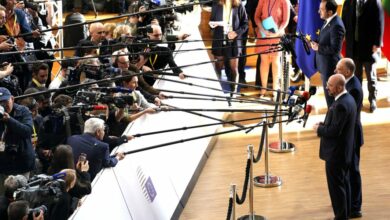Ex-Meta recruiter: Skipping questions is an interview ‘red flag’, says Jenn Bouchard


It’s always painfully awkward when the hiring manager throws the curveball, “Do you have any questions for us?” at you. More often than not, there’s nothing left to cover. The usual topics—like what the job actually entails and how many days you’re expected to show face in the office—tend to arise naturally early on during the interview. But be warned: Not mustering up the effort to think of anything to ask could cost you the job.
That’s at least according to Jenn Bouchard, Meta’s former global head of talent and current Chief People and Administration Officer at the creative agency, Figure8.
“If candidates don’t have follow-up questions that they’ve pulled through from the interview or if they just say ‘I’ve had all of my questions answered’, that’s a red flag,” Bouchard tells Fortune.
Having worked in talent acquisition for more than 15 years, Bouchard learned that the absence of questions from candidates generally signals “disinterest” in the job they’re applying for.
“An interview is a two-way experience,” she explains. “And so as much as I’m getting to know the candidate, I also want them to be curious about getting to know the role, the company, the culture, even the team that they might be walking into.”
3 questions to have up your sleeve
Sweaty palms and drawing blank can get the best of us: It’s completely understandable – normal even – to be nervous during a job interview, Bouchard sympathizes.
So instead of relying on thinking of something great on the spot, it’s a good idea to have some questions up your sleeve to impress the hiring manager.
These are a few questions that have wowed Bouchard in past interviews:
- What’s the hardest problem that you’re trying to solve? What has the team not been able to solve? And why do you think that is?
- What are the top three strengths of the team? And how will this person add to the strengths of that team?
Meanwhile, for those eager to gain genuine insight into the company culture of a prospective employer, Bouchard recommends asking the recruiter: What has the leadership team recently implemented based on employee feedback?
“That for me would let you understand how the company listens to their employees, how often they listen to their employees, the value of the employee feedback, as well as leadership’s investment in the workforce and how attuned they are to the needs of that workforce as well,” she adds.
Email them after for extra brownie points
Once the adrenaline buzz of facing your potential future boss—be it across a table or through a Zoom screen—has subsided, a follow-up email wouldn’t go amiss.
Although the topic of thank you notes is quite contentious—with some arguing that it can look desperate and adds to a hiring manager’s already full plate—in Bouchard eye’s it separates the “smartest candidates” out from the rest.
Better yet, telling them what you learned from the process is a major green flag in her book.
“A quick note to appreciate someone’s time with something that they’ve taken away from the interview, really lets me know that they were present, engaged and continuously excited about the roles that we have at the company,” Bouchard explains.
“That’s the standout piece for me, that you’re able to reiterate something that you learned or something that made the candidate excited about the role.”
Why? “It shows to me that level of interest that we continue to look for from candidates.”




